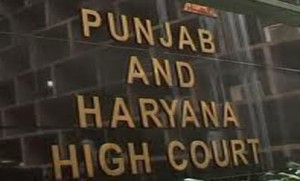General News
Mohali resident files PIL in High court seeking pre-mature release for prisoners; (2) Legal v. Political options
December 21, 2013 | By Sikh Siyasat Bureau
Chandigarh, Punjab (December 21, 2013): It is learnt from certain media sources that a Mohali resident Mandeep Kaur filed a Public Interest Litigation (PIL) in the Punjab and Haryana High Court, seeking directions to the State of Punjab, the UT Home Secretary and Burail Jail Superintendent to release detainees in Chandigarh and Punjab jails who have completed minimum mandatory terms of sentences of life imprisonment.
According to The Tribune (TT) [d]irections have also been sought for compensating the detainees and initiating legal action against “guilty officials”.
 Referring to a news report carried in these columns, Mandeep Kaur through counsel Dalip Mahajan, said Gurmeet Singh, Lakhwinder Singh and Shamsher Singh were lodged in the Burail jail since 1995. “They have already served a jail sentence of 18 years, and have no criminal background.”
Referring to a news report carried in these columns, Mandeep Kaur through counsel Dalip Mahajan, said Gurmeet Singh, Lakhwinder Singh and Shamsher Singh were lodged in the Burail jail since 1995. “They have already served a jail sentence of 18 years, and have no criminal background.”
The other three Sikh detainees, Lal Singh, Waryam Singh and Gurdeep Singh Khera, had spent over 20 years in jail, she said.
She said many more prisoners were languishing in Punjab jails though they had completed their jail term and their further detention was illegal.
“The act and conduct on the part of the respondents has been in violation of Article 21 and 14 of the Constitution of India”, the petitioner argued. Claiming that the detainees were entitled to be released with immediate effect as they had completed their term, she said detention after undergoing the prescribed sentence was “illegal”. Counsel Mahajan said the law points involved in the matter were whether the prisoners who had completed their term were not entitled to be released and whether the detainees were not entitled to exemplary compensation.
The petition is expected to come up for hearing during the winter vacation.
Pre-mature release – Legal v. Political options:
It is notable that as per Indian law, life imprisonment is considered to be for entire life however there are provision in applicable jail manuals according to which the government may grant pre-mature release to life term convict after they have completed 14 years of imprisonment. These decisions are taken by the executive and thus considered to be political decisions.
It is notable that Punjab and Haryana High Court had issued directions to the Gujrat government to consider the case of Lal Singh (in Maximum security jail Nabha, Punjab) terming his case to be ‘a fit case for permanent release from prison’; but the Gujrat government did not grant pre-mature release to Lal Singh. The matter is pending in the supreme court.
Whereas, the Uttar Pradesh government in according to same decision by Punjab and Haryana High Court granted pre-mature to Major Singh. (NOTE: High Court had delivered joint decision in Lal Singh and Major Singh’s case and directions were issued to Gujrat and UP government in respective cases).
It shows that it is the political will of the appropriate government which could be regarded as central point in this matter. If the government is willing to grant pre-mature release to the life term convicts, there is no legal or constitutional bar.
Important Stance against Indeterminate Life Sentence:
The Punjab and Haryana High Court decision in Lal Singh and Major Singh’s cases is a vital stance against indeterminate life imprisonment terming it to be even worse than death sentence.
While pronouncing a decision clearing pre-mature release of Lal Singh (not released yet) and Major Singh (released by Uttar Pardesh government), Justice Paramjeet Singh of the Punjab and Haryana High Court observed that [t]he lifelong imprisonment pays a little regard to human right and human dignity. Life imprisonment must be reviewed after certain intervals say 14 years as per the […] Jail Rules as applicable in the State […], otherwise indeterminate imprisonment will be cruel and unusual punishment.
The learned High Court judge further noted in his decision that [i]rreducible life sentence raises an issue under the UNIVERSAL DECLARATION OF HUMAN RIGHTS: Article 5 whereof says that “No one shall be subjected to torture or to cruel, inhuman or degrading treatment or punishment”.
He further noted that [t]he essential core of the humanity is that everyone is redeemable. Indeterminate imprisonment removes any prospect of reward for change and is therefore, fundamentally inhumane.
“In real sense to my mind, never going to be released is equivalent to worse sanction than death sentence. So, it can be termed as cruel, barbaric, inhumane and against the human dignity. Whole of the natural life imprisonment means nothing in life to a prisoner. It means he will die in prison. Such a punishment is untenable in a civilised society. To make the prisoner realise that world no longer exists for him, he is no longer a part of it, will certainly lead to inhumane living and against the principles of Article 21 of the Constitution, such action is not sustainable to my mind” Justice Paramjeet Singh noted (Excerpts from a joint decision in cases: (1) Lal Singh @ Manjit Singh v. State of Gujarat and others (2) Major Singh v. State of Uttar Pradesh and others – pronounced on 23 August, 2012 by Justice Paramjeet Singh of Punjab and Haryana High Court).
To Get Sikh Siyasat News Alerts via WhatsApp:
(1) Save Our WhatsApp Number 0091-855-606-7689 to your phone contacts; and
(2) Send us Your Name via WhatsApp. Click Here to Send WhatsApp Message Now.
Sikh Siyasat is on Telegram Now. Subscribe to our Telegram Channel
Related Topics: Bandi Singhs Rihai Morcha (Amb Sahib) 2013, Bhai Lal Singh Akalgarh, Gurbaksh Singh Khalsa, Punjab and Haryana High Court, Sikhs in Jails




